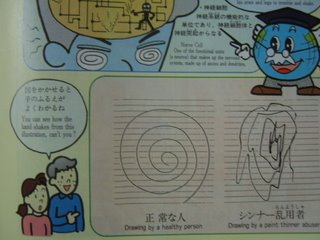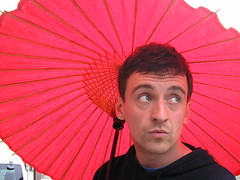...and Rock & Roll.
I was twenty-one when I first heard John Zorns’ Naked City project - a super-group of established jazz artists such as Bill Frisell and Fred Frith, with the occasional appearance by Yamatsuka Eye - a shrieking ball of howls, grunts, roars and belches.
“He can’t possibly do that for a living.” I thought, filing Yamatsuka san under “investigate”. Months later, he popped up again on a recording of an improvised gig in Manchester no less, under the truly inspired moniker of MC Hellshit. That did it, and I decided to read up on him.
Imagine my joy when I found out that he fronted a Japanese rock band called Boredoms. Thus, a love affair which continues to this day was born. I started listening to their music just as it changed direction, towards psychedelic trance-rock, but they had a back-catalogue of more abrasive stuff. One reviewer described Boredoms music of this period as “punk rock torn to pieces and then stapled back together again”…sections of improvised noise from Yamatsuka san and the rest of the band (of a similar vocal persuasion) complimented with cartoon rock, which is heavy, obnoxious, definitely not the sort of thing you’d play to your mother or in-laws and laced with a gloriously demented sense of humour.
Joy, thought I. Rapture, even. Here was a whole new world of music to discover. I then began investigating what Japanese music I could. Just as noisy as Boredoms, but a lot tighter musically, are Melt Banana. To call upon another reviewer, Melt Banana are a “steel locomotive going full speed through a brick wall”. It’s excellent cleaning-the-house music, fast, relentless and exhausting.
My stint at the Library had me encountering the delightful peculiarities of Asa Chang & Junray, the likes of whom I’ve never heard before. Asa Chang formerly led the Tokyo Ska Paradise Orchestra, then from what I can gather, took up the tablas and went off to form this group. They combine elements of traditional Indian music with…whatever they can find by the look of it. There’s something Gilliam-esque about Asa Chang and Junray. Each piece is like a weird little machine, sometimes gracefully and beautifully complex, other times slightly comical.
Like a Lovecraftian hero, I discovered the chaotic horrors of Merzbow, who since the 70’s has plowed a deafening furrow in a field occupied by groups such as Throbbing Gristle. Then I found the sublime work of Susumu Yokota. He made his name in the Rave craze of the early nineties, then retreated into the mountains to construct artfully restrained ambient works. He has a prolific output, still releasing an album of DJ fodder every now and then…I heartily recommend anything of his to anyone.
So anyway, with these characters under my belt, I hopped onto a plane to Japan, part of me expecting rather naively that I’d discover a dearth of interesting music…
J-Pop (go here for an article about the history of…) is a term that describes the bulk of pop music made in Japan. Other genres are marked as J-Club, J-Reggae, J-Punk etc…Jazz however is Japanese Jazz (J-Jazz is just silly)…I think the obscene creature that is J-Pop has grown out of Japans insatiable thirst for the rest of the world, and their desire to make it Japanese. It’s like they’ve seen what is considered pop music and imitated it, exaggerating what is to them, its’ most prominent features. Thusly we have very highly produced, glittery, shiny, spangly AUDIO-JOY, or poignant, heart-breaking, desperately earnest POWER-BALLADS. It is hideous. If ever a nation deserved to drown in a lake of cheese…
You can accuse any Pop Music market of being obsessed with the young, fresh faced and new…one group however manage to take that thought to it’s most ridiculous extreme, yet still remain perfectly logical (especially if you're a foaming cynic). Morning Musume was founded in 1997 by producer Tsunku. The group (made up of girls aged from 12-24) exists independently of the members, who have a near constant turn-over, retiring once they're considered too old, or if they’re found to be doing anything inappropriate to the bands image, such as having a relationship. Yes indeed, sex sells.
There’s still fun to be had in the mainstream though. Big in the mid to late nineties were Judy and Mary, truly everything you expect a Japanese Pop/Rock group to sound like - boppy, noisy, stompy, cheerful and unsophisticated yet competent, bringing you songs such as “Cheese Pizza“ wherein the heroine’s icy heart melts like a...yes. Poetry. Their former front-lady, Yuki, has had a successful solo career since then, and I will confess to being partial to her squeaky voice.
Exploding with success just before I arrived were Orange Range, performing a kind of rap, with a kind of heavy rock, with lots of squiggly synth noises. Success over here is equated with having your music associated with products, movies and adverts, which makes sense, as Japan has the second largest music industry in the world, and you’d be hard pressed to hear of any of their famous bands outside of the country.
But, what of Boredoms? What of Susumu Yokota? In all the conversations I’ve had with Japanese people about music, only two of them have heard of Boredoms. Unsurprising really, considering what they are faced with in terms of popular appeal. The upside is that when I happen to play MC Hellshit to my students, I take an impish glee in seeing the looks on their faces when I inform them of his origins…
...my thanks to Wikipedia...
Labels: culture (shock), I wasn't expecting that, Japan, music, school, students





